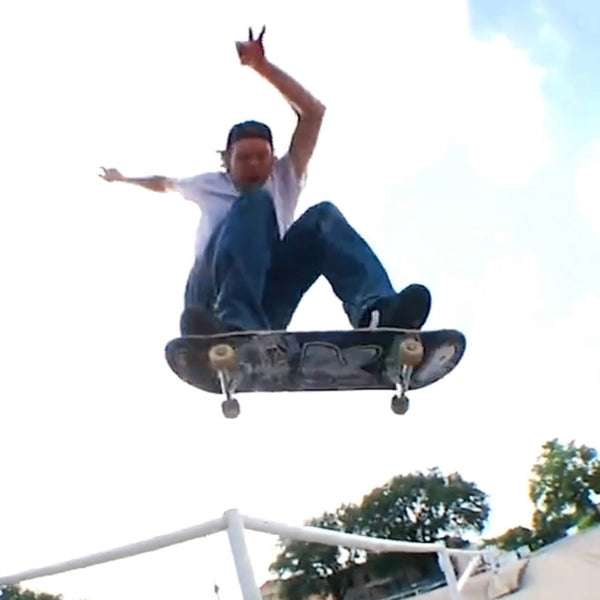Your cart is empty!
Graduates - Nytaï Aidlin
There's a whole lot of essays, books and talks surrounding skateboarding. You sort of wonder where it all started. At what point did someone take skateboarding and 'intellectualise' (in no way as an inflammatory term) it?
Our inadvertently semi-popular series of 'Graduates' interviews continues in the form of Nytaï Aidlin. A Swiss native who studied in the Netherlands Nytaï contacted me with the question, "I actually didn’t study in Bristol, but in the Netherlands… does that still fit your criteria?" hopefully as this grows we'll continue to see students and academics come through from across the world.
Feel free to email if you want to get involved - fraserdoughty@googlemail.com
Read our first 'Graduates' interview with Chandon Gallagher here

photo - Rayan Asensio
I studied at Maastricht University in the Netherlands, and it was so cool.
I studied Sociology which was part of the Art & Culture programme. It allows students to understand how Western Culture came to be and what it is today through different prisms: Philosophy, History, Science, Politics, Art, Media etc. Emphasis was made in what connects these topics, for example how new Media (Facebook, Twitter…) influence Politics (Democracy or Dictatorship), or how Philosophy and Art modulate how we organise as societies.
Why did you choose Maastricht as the city to study in? Was Sociology a subject you already had an interest in?
Sometimes, I wonder why I went… for someone from Switzerland, going to the Netherlands is unusual. There is no mountain to enjoy in Winter! It only rains Hahaha. I laugh but winter is shit.
Honestly, I didn’t really want to study. Following high school I worked and travelled for two years and at the end I had the feeling I needed something different. I visited all my friends at different Universities, studying different topics and damn, it was boring. Having a teacher in front of the class talking for hours while people pretend to listen was so absurd. I could not handle that.
Then I heard about the Problem-Based-Approach of Maastricht. Without going too much into the practical details, it works as follows: you meet once to discuss a given topic with your fellow, mention some questions about it, and then can go read your papers wherever you want. Next week, you come back with the answers you found, or the questions you have and exchange with other students. Basically, you go to class to discuss. The teacher is only here to make sure we don’t derive from the topic, they are not allowed to take the lead. One day, the class asked the teacher to stop talking… cool no?!

Can you expand on how skateboarding informed your choice of degree to study?
Skateboarding did not really inform my choice of degree, but it definitely allowed me to have fun whilst studying. Anytime I could connect skateboarding with any topic, I would do it and write essays about skateboarding. It really opened my mind on how skateboarding is so much more than what it looks.
What was the title of your dissertation?
“Skateboarding, Autonomy, and Local Agency. Interpretation of Skateboarding as an Educational and Development Tool.” My case study was the Concrete Jungle Project in Peru. They are such great people, if you don’t know them go check out what they are doing, it is crazy.
I also wrote two other essays about skateboarding:
“Street-Skateboarding and the Situationist International: An alternative understanding of the city.”
“Literature Review - Skateboard and Identity”.
It was nice to chill at coffee places, drinking cappuccinos and reading academic thoughts about skateboarding… I highly recommend trying it.
What research methods did you utilise to bring the piece of work together?
The classical sociological methods. Semi-structured interviews and Discourse Analysis. They are fun to apply and easy to make sense of.

Has your time at university led to a job within the skateboarding industry?
After studying, I came back to Switzerland to try something new. Alongside some friends we launched the organisation Rookie Slash which promotes the inclusion of refugees through outdoor and board sports. We teach skateboarding of course but also climbing, slack-lining, water diving and snowboarding. The idea is that behind each of these sports, you have a community that is inclusive and positive. By building a bridge between the city's newcomers and these community-sports, we can offer the opportunity for meeting the locals, learning the language and discovering a new passion. Hopefully through participating in these sports we are helping young refugees in feeling home and integrated in our city.
I also wrote some articles for Whiteout Snowboard Magazine in exchange for some snowboarding material. Big up to Ahriel, thank you so much!
Today, I am back to studying. Swiss companies love degrees and in my case I better have some sort of local diplomas here.
Lastly, would you recommend going into higher education?
Not necessarily. From my experience, people value experience more than high education. Also, why study 6 years in a business school if you could open your dream coffee shop instead? On the other hand education is also what allows you to access certain privileges. So it really depends on your goal and interest.
Anyway, I would recommend not rushing into studies. The education path is sometimes more of a highway. You go fast, end up with a random job, and you miss most of the landscape and experience. I believe life should be more of a bicycle ride on unknown territory. Getting lost from time to time really helped me find myself.
 Photo - Anthony Gailleres
Photo - Anthony Gailleres



